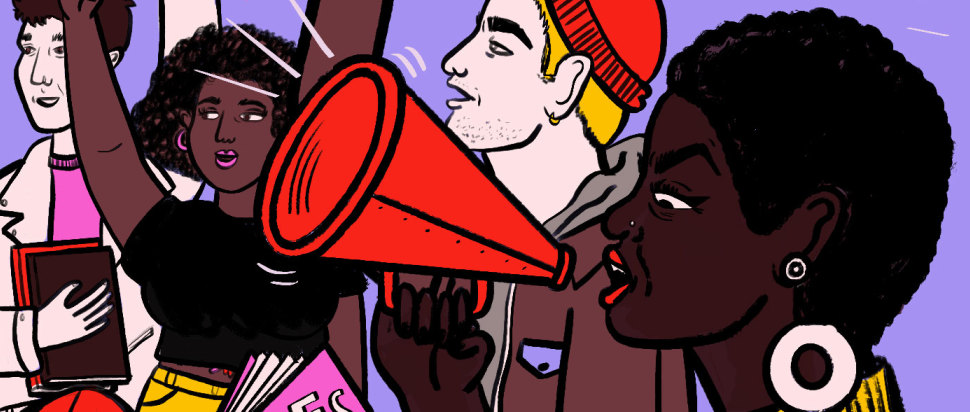Protest Poetry: UCU university strikes & creative solidarity
As thousands of university workers across the country go on strike, we take a look at the outpouring of creative projects being produced as part of the protest
It’s a familiar story to anyone involved in contemporary academia: precarious, short-term contracts are propping up the UK’s entire higher education system. According to University and College Union (UCU), 46% of British universities use zero-hour contracts to deliver teaching, with 68% of staff on fixed term contracts, often undertaking hundreds of hours of work that they are not paid for.
This current university strike is the third to take place in two years, and the second in four months. It is also the first which does not directly affect me. After teaching two years, four courses and 12 classes at the University of Edinburgh, my contract expired in January and I was told it wouldn’t be renewed.
This casualisation of labour and its impact on the ever-widening gender and race pay gap is one of the cornerstones of the UCU strikes. The other surrounds pensions and protests a model that would see lecturers pay on average £40,000 more into their pension only to receive £200,000 less over the course of their retirement. These issues don’t even encompass the concerns of overworked and underpaid administrative and public service staff, many of whom don’t earn above the threshold to be eligible for UCU representation. Meanwhile, student fees are rising, class sizes are increasing and student satisfaction – itself an absurdly consumerist metric – is at an all-time low.
This capitalist position is one that is fundamentally incompatible with the university as a space of learning, according to UCU Scotland Vice President, Lena Wånggren. “To me, education is a civic good, a means of liberation and collective change,” explains Wånggren. “But when functioning according to the market logics of neoliberal capitalism, the main goal of education becomes not education itself, but profit.” It’s a system that benefits neither staff nor students with young people paying £9000 a year, if not more, to be pushed through a programme that is structurally set up to disregard their education.
This understanding between staff and students – that they are on the same side of the fight – led to the creation of the Staff-Student Solidarity Network at the University of Edinburgh during the 2019 strike, with members of the network staging an occupation of David Hume Tower and publishing a zine called 'Another University is Possible,' one of numerous creative responses to the unfair working conditions in British universities.
“I really believe in archives and tangible objects,” explains one of the student organisers behind the network. “We wanted to show that there is another way to think about the university, that there is a counter narrative.” Filled with collages, articles and photos protesting casualization and exploitation – many addressed directly to University of Edinburgh Principal, Peter Mathieson, who was infamously paid £26,000 in moving fees (including his pets) – the zine is a vibrant, emotive expression of radical anger, made using print credit offered by various tutors, a credit that often amounts to twice their monthly teaching income.
A similar project took place on the picket lines at the University of Glasgow. On Being Used was a zine edited by the University of Glasgow’s Sophie Collins, Kirsty Dunlop, Jane Goldman, Colin Herd and Maria Sledmere. A collection of cut outs and poems contributed by both staff and students, each page is a virulent protest against the precarity, privatisation and commodification that defines the modern university.
“For me, creative projects have both a social and educational function, in the sense that they can bring a wider cohort of people up to speed on crucial issues around the strike, but also their collaborative, anthologising nature means that numerous voices can be brought together,” Sledmere explains, pointing to zines as a particular tool for personal protest. “The zine feels like the ideal medium for voicing precarity and holding your rights and needs collectively. It's a gesture of friendship, curiosity and play – it's a statement of solidarity.”
Nell Osborne, a researcher at the University of Manchester, agrees with the radical potential of zines and their potency in strike action. Along with Hilary White, Osborne co-edits Academics Against Networking, a creative challenge to the institutionalisation of knowledge and community at universities. “I think zine culture is a particularly useful site for supporting workers’ struggles since it developed in direct antagonism to ideas of institutional knowledge, taste, legitimacy, value and circulation. Zines seem particularly important in the context of the university: they don't acknowledge structures of hierarchy, exclusivity or bureaucracy.”
The collective anger behind these zines throws into sharp, heart-breaking relief the extent to which our current higher education model is failing both students and staff alike. Yet these astonishingly innovative, daring works, built into the fabric of the UCU strikes, also reveal the possibility of another, imagined university based on community, care and knowledge as liberation. It’s the university where students – victims of yet another tuition fee hike – deserve to go and the university where my peers and I have always dreamed of teaching. As with all industrial action, these strikes are a step towards making it a reality.
For more information, visit ucu.org.uk
